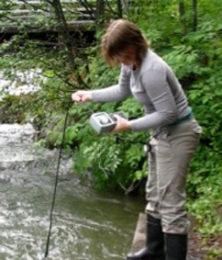
Name
Kristen Gibson, Ph.D.
Title
Assistant Professor of Molecular Food Safety Microbiology
Institution
University of Arkansas
Education
B.S., Microbiology and Molecular Biology, University of Central Florida; Ph.D., Environmental Health Sciences, Johns Hopkins Bloomberg School of Public Health, Postdoc, Food Science, University of Arkansas
What brought you to the University of Arkansas?
My husband was transferred to a position in Arkansas so I applied for an open post-doctoral research position at the University of Arkansas after I completed my Ph.D. Eventually a faculty position opened up there and I am currently an Assistant Professor of Molecular Food Safety Microbiology at the University of Arkansas.
How did you learn about the Center for Produce Safety?
I was frequently meeting with Oklahoma State University colleagues in 2010 and they were brainstorming different grant opportunities available in the area of food safety. They kept bringing up the Center for Produce Safety and I applied in 2011. I submitted proposals to the last three RFPs and I received funding for my project this year.
Why did you apply for funding from CPS?
In my postdoc position I was stationed at the Center for Food Safety at the University of Arkansas. At that time the focus was mainly on other commodities, most notably poultry. I felt that research was lacking in the field of fresh produce, so I started submitting proposals to CPS RFPs in 2011. Now as faculty, my goal is to develop a produce safety research program at the University of Arkansas.
In 2013 CPS funded your project, “Evaluation of pathogen survival in fresh water sediments and potential impact on irrigation water quality sampling programs.” What do you hope to accomplish?
This is a proof of concept project. This project will look at the relationships between pathogens and fresh water sediments. Fresh water sediments can harbor bacteria and pathogens that aren’t always detected with current testing methods. We hope that this work will generate data to inform a risk-based sampling strategy, with the goal of helping operations decide which method works best for them, depending on the origin of their water resources. We hope to give options to the industry because there isn’t a “one size fits all” method of testing water.
What are the key factors influencing this field of inquiry?
The food industry relies heavily on water resources. The water quality systems currently in place don’t always indicate the presence of all potentially harmful pathogens. Many producers rely on testing methods that are outdated and, therefore, unreliable in testing all harmful pathogens. We will move toward a method of modeling to indicate Fecal Indicator Bacteria (FIB) in water sources and determine which pathogens are more likely to correspond with the presence of FIB. The sediment quality will also be a key factor in this project.
Where do you see the field of food safety research 5 years down the road? Why?
I believe we’ll still be addressing some of the same issues, but with different pathogens. Microbes are smart; they evolve and new ones pop up. The food industry in general needs to be more proactive, rather than reactive, to food safety issues. If we become more proactive, we can better predict potential problems and have a response plan in place more quickly.
Aside from working in the laboratory, how else do you spend your time?
I am lucky to live very close to the Ozark Mountains and whenever my husband and I have free time we go hiking in the mountains with our two dogs. Most recently we welcomed a baby, so between work and a newborn, we are very busy.
Describe one or more of your career highlights
I was recently selected as a recipient of a USDA NIFA grant. This is a big deal for me as it is the first national award I have received and it will allow me to continue my focus on addressing fresh produce safety issues. The project will directly address safe fresh produce handling at farmers’ markets. Farmers’ markets are a growing phenomenon and it is only a matter of time before a potentially harmful food safety issue crops up. The goal of the project is to provide the consumer (in addition to the growers) with useful information on how to handle fresh produce and prevent pathogen transference.